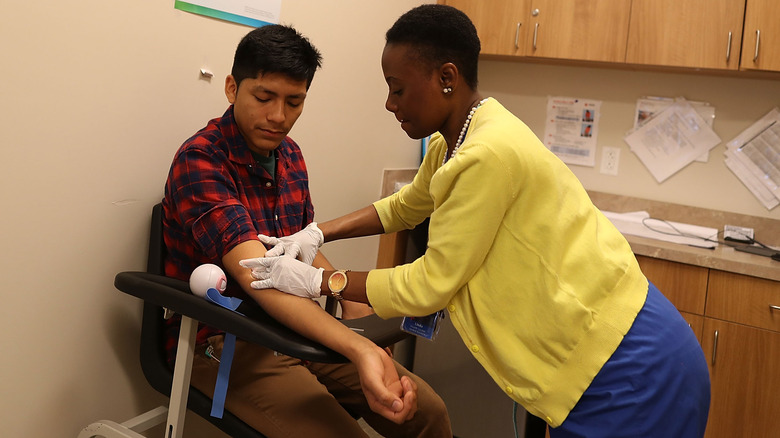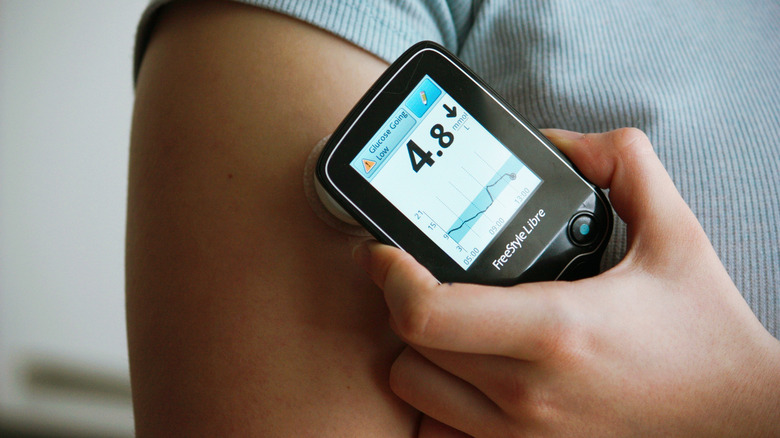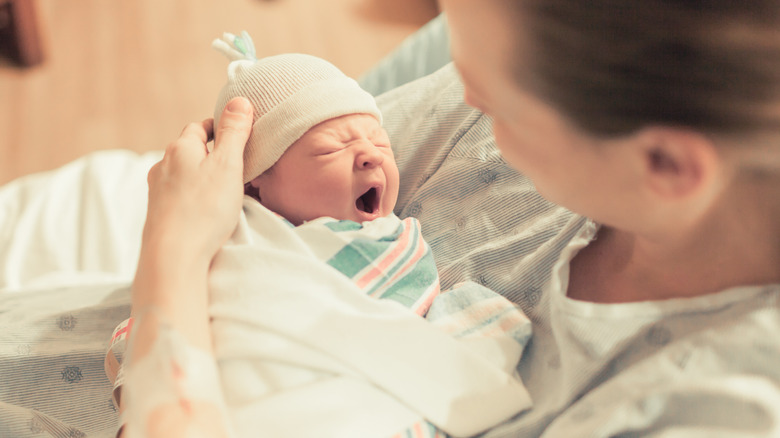Surprising Ways Your Blood Type Can Affect Your Health
If you don't know your blood type, that's not surprising. One survey found that more people know their WiFi password than their own blood type. (Solution: use your blood type as your password?) But know it or not, your blood type is still important.
First, let's back up a little. What exactly is a blood type? There are many ways that scientists categorize blood, but the one most people have at least heard of is the ABO system (via Scientific American). It's based on proteins found on the surface of your red blood cells. If they have type A proteins (also called antigens) you have blood type A. Type B proteins? Blood type B. Or you might have both (blood type AB), or neither (blood type O). Along with that, your blood may or may not contain a protein called Rh factor, making it "positive" or "negative" (e.g., A+, O+, AB-), the American Red Cross explained.
There's plenty we don't know about blood types, like why do we even have them? There's a lot of unscientific malarkey about them, too, like the idea that your blood type should determine your diet. Nevertheless, solid research shows that our blood type does affect our health, and in some ways we're only starting to understand. Let's take a look.
People with type A blood are more vulnerable to E. coli
A toxin-producing strain of the E. coli bacterium causes millions of cases of infectious diarrhea in the developing world and thousands of deaths, especially among children. Less seriously, it can cause travelers' diarrhea and occasional outbreaks in developed nations. But not everyone who's infected by the germ develops symptoms, and understanding why that is could help researchers develop a protective vaccine (via WebMD).
Believe it or not, one way scientists study this is to infect volunteers with the bacteria and observe how it operates. (Volunteers are treated with antibiotics before the infection becomes dangerous.) As shown in a 2019 study published in The Journal of Clinical Investigation, researchers analyzed blood samples from volunteers and found that illness progressed more rapidly in people with blood types A and AB compared to types B or O. Those with A or AB blood types needed antibiotic treatment sooner than the other types, and their symptoms were more severe.
It seems that the bacteria has an easier time attaching to the intestinal cells of people with the type A blood, according to WebMD. A vaccine which targets the protein that enables this attachment could be an effective tool in protecting people from infection.
People with type O blood are more likely to die after trauma
People who have blood type O seem less likely to form blood clots, though the reason isn't clear, says the American Heart Association. This might translate to a lower risk of some types of heart disease. But it may also put those people at higher risk of fatal blood loss after a car accident or similar severe trauma.
A 2018 study published in Critical Care identified 901 cases of severe injuries at two emergency medical centers in Japan and compared the outcomes to the patients' blood type. The data showed that people with type O blood were more than twice as likely to die in the hospital compared to other blood types. They were more likely to die from blood loss or traumatic brain injury, and needed to spend more time on a ventilator. Clarifying how blood type affects mortality after severe trauma could enable providers to tailor emergency care for patients at greatest risk, the researchers noted.
Heart disease risk is lower with type O blood
Research pointing to a link between blood type and heart disease has been around for a while. In 2012, the inconsistent results of prior studies was reanalyzed and combined with new data, showing that people with blood type A, B, or AB have an 11 percent higher risk of developing coronary heart disease compared to blood type O (via American Heart Association Journal).
The difference in risk seems to be related to the likelihood of developing blood clots, says the American Heart Association. A 2020 study of more than 400,000 people not only found that heart disease risk was 10 percent higher in people with blood type A or B compared to type O, it also showed that the non-O blood types were 51 percent more likely to develop a blood clot in the legs (deep vein thrombosis) and 47 percent more likely to develop a clot in the lungs known as a pulmonary embolism (via American Heart Association). The reasons aren't understood, but they can help doctors and their patients determine who needs to pay extra attention to lowering their risk with diet and exercise.
Blood type O is protective against malaria
Malaria is a potentially fatal disease caused by a microscopic parasite that's transmitted to humans via mosquito bite. In 2019, an estimated 229 million cases of malaria occurred worldwide and 409,000 people died, mostly children in Africa, according to the Centers for Disease Control and Prevention. About 2,000 cases of malaria are diagnosed in the United States each year, mostly in travelers and immigrants returning from countries where malaria is prevalent (via CDC).
Decades of research has pointed to lower risk of contracting malaria for people with blood type O, and a 2019 analysis of previous studies published in Blood Review confirmed that severe malaria infection is more likely in people with non-O blood types. This may be why blood type O is more common in areas where malaria is endemic, like sub-Saharan Africa, study co-author Abraham Degarege Mengist said in a press release.
The reason that malaria infection is less likely in blood type O may be due to the effect that malaria has on blood cells. The infecting parasites release proteins that cause blood cells to clump together, forming clots that block blood vessels and cause symptoms. These sticky proteins seem to have a harder time attaching to type O blood cells (via Research Features).
Mosquitoes prefer type O blood
You may not think of mosquitoes as gourmands, but at least some species seem to have a preference for what type of blood to feed on, reports Healthline. In a small study, 64 volunteers exposed their arms to an aquarium of mosquitoes (you can stop itching; these mosquitoes had their proboscises removed so they couldn't actually bite). More mosquitoes landed on people with blood type O than any other type, but the difference was only statistically meaningful when comparing type O with type A.
The researchers also found that if they placed blood type proteins on the skin of the volunteers, mosquitoes were least attracted to blood type A. Overall, mosquitoes preferred type O the most, followed by type B, AB, and A. Blood type proteins do naturally appear on the skin, the researchers said, but it's not clear mosquitoes can detect them.
Additionally, in a 2019 study published in the American Journal of Entomology, researchers exposed a different species of mosquito, the type that carries malaria, to blood samples. They found that the skeeters preferred to feed on type O blood. The researchers suggested that because type O blood is less prone to clotting, it may be an easier meal for the mosquito.
Blood type O makes you more vulnerable to cholera
Cholera is a disease caused by infection with a bacterium that typically spreads when drinking water is contaminated by human waste. An estimated 2.9 million cases and 95,000 deaths occur from cholera each year around the world. About 10 percent of people who get sick with cholera will develop severe symptoms such as watery diarrhea, vomiting, and leg cramps, leading to potentially fatal dehydration and shock (via the Centers for Disease Control and Prevention).
Scientists noticed decades ago that people with type O blood tend to develop more severe symptoms and are more likely to need hospitalization compared to people with other blood types. A 2016 study suggests that the toxins produced by the cholera bacteria have a bigger effect on the intestinal cells of people with type O blood. When exposed to the toxins, type O cells produce a signaling molecule that causes them to release water and electrolytes, which could contribute to dehydration and other cholera symptoms. It could be that proteins of the surface of type A and B blunt some of the toxin's effect, study author James Fleckenstein said in a press release about the research.
Type O blood lowers your risk of diabetes
Researchers examined the medical data of nearly 99,000 women participating in an ongoing health study and found that those with type A blood had a 10 percent higher risk of developing type 2 diabetes compared to type O women (via ScienceDirect). For those with blood type B, the risk was 21 percent higher. However, women with the AB blood type showed no statistically meaningful difference in risk. When Rh factor was considered, those with O- blood had the lowest diabetes risk. A+ and A- types showed a 17 percent and 22 percent higher risk, respectively. And the risk for women with AB+ was 26 percent higher (all in comparison to blood type O-).
Though this study included women only, the researchers say that there's no biological reason that men wouldn't show the same results. In another study, an analysis of data from previous research also found that type O blood was associated with a lower prevalence of diabetes, while type B was linked to higher risk. The reason for the connection isn't clear, according to the study authors, but it's known that the blood types affect proteins that have been linked to diabetes.
Your blood type may affect your risk of certain cancers
Studies of cancer risk and blood type dating back to the 1950s have produced conflicting results, but an academic review of research done through 2015 suggests some connection (via Future Science). That report found that having type O blood reduced the risk of pancreatic, breast, ovarian, esophageal, gastric (stomach), and colorectal cancers. The risk tended to be lower by 10 to 25 percent for type O people. Some studies found that type A raised the risk of specific cancers compared to the other blood types.
The strongest effect seems to be for stomach and pancreatic cancer, according to the researchers. It could be that a bacterium involved in these cancers finds it easier to attach to the protein found on the cells of people with type A blood. Since there are so many other factors that affect cancer risk, blood type alone probably isn't a useful marker, the researchers said. But understanding how it works could lead to new methods for prevention and treatment.
People with type O blood have a higher risk of ulcers
A large body of research has connected blood type O with an increased risk for ulcer. The first studies to document it were published in the early 1950s. Then, in 2010, a large study published in American Journal of Epidemiology confirmed the connection when Swedish researchers tracked the health of more than 1 million blood donors over the course of 35 years. They found that compared to blood type O, the risk of stomach ulcer was lower for blood types A (9 percent lower), B (23 percent), and AB (17 percent). Likelihood of an ulcer in the duodenum (small intestine) was also lower for non-O types.
How blood types affect diseases of the stomach and digestive tract isn't really understood, according to a more recent study that found a similar pattern in a Japanese population. Those researchers noted that there may be immune system differences that come along with the different blood groups. And since stomach ulcers are typically caused by a bacterial infection (not spicy food, as many people falsely believe), it may be that the cells of people with type O are more vulnerable to the bacteria, the researchers said.
Some infants are at risk from their mom's blood type
Along with the A and B proteins, blood types can be classified by the presence or absence of a protein called Rh factor. Most people in the U.S. are Rh positive, meaning they have the protein on their red blood cells (via Carter Bloodcare).
Rh type is inherited, with each parent contributing an Rh positive or Rh negative gene. Generally, Rh status has no impact on health. But if a pregnant woman is Rh negative, and her baby is Rh positive, a condition called Rh disease can occur (via March of Dimes). Should their blood mix during pregnancy, the Rh factor in the baby's blood will trigger an attack by the mother's immune system. This is a danger to the baby's health, with the potential to cause anemia, brain damage, jaundice, and even death.
When this Rh incompatibility happens, it typically doesn't affect a first pregnancy. But subsequent pregnancies are endangered, since the mother's immune system is now primed against the Rh factor. Fortunately, a blood test during early prenatal care can identify who's at risk, and treatment is available to keep the mother's immune system from targeting the Rh protein (via March of Dimes).
People with type AB blood are more likely to experience memory problems
The AB blood type is the rarest, occurring in less than 4 percent of the U.S. population. On the plus side, people with this blood type can receive blood transfusions of type O, A, or B (via American Red Cross). But a possible downside for those folks is that the AB blood type is associated with a greater likelihood of developing cognitive impairment as they age.
Researchers used data from a large health study to identify people who'd developed thinking and memory problems over the course of three years or so. They compared their blood type with people from the same study whose cognition hadn't changed. It turned out that compared to other groups, people with AB blood were 82 percent more likely to have difficulties with day-to-day memory, language, and attention. It may be that the lower risk of cardiovascular disease that's been found with some blood types also protects the brain, study author Mary Cushman said in a press release.
Women with blood type O could possibly have more fertility issues
As women age, they experience what fertility doctors call "diminished ovarian reserve," meaning their ovaries contain fewer eggs that can be successfully fertilized. Sometimes this happens earlier in life, contributing to fertility problems (via LiveScience). A 2011 study published in Human Reproduction examined the data from 544 women at two fertility clinics. Researchers found that women with type O blood were twice as likely as women with type A or AB to have indications of diminishment (it's detected via blood levels of a particular hormone).
However, the full implications aren't clear. "I don't want the message to be that women in the healthy population should be petrified that their blood type may predict compromised fertility," study author Lubna Pal told LiveScience. Plus, a 2021 study published in Reproductive Biology and Endocrinology analyzed previously published research and no significant difference in ovarian reserve was found.
"Blood groups should not be taken into account excessively during diagnosis and treatment of infertile women," the researchers wrote. They added that more clinical studies are needed to confirm any link between blood type and fertility in women.
People with blood type O appear to be less vulnerable to COVID-19
Since the COVID-19 pandemic began, researchers have been investigating all sorts of risk factors that increase susceptibility to the virus. And since blood type has been known to affect other kinds of viruses, its potential to affect COVID-19 has been the subject of multiple studies.
Researchers in Denmark compared medical data of nearly 475,000 people who'd contracted COVID-19 with records of over 2 million uninfected people from the general population. They found that blood type O was less common among people who were COVID-19 positive. Types A, B, and AB were more prevalent compared to people who'd never been infected. In a separate study, a research team in Canada compared blood type among 95 patients with severe COVID-19 infection. They found that those with blood types A and AB were more likely to need a ventilator and needed more time in intensive care when compared to patients with blood type O or B.
How does blood type relate to infection risk? It's possible that the virus finds it easier to attach to cells which surfaces have the protein that comes with blood type A, reported U.S. News & World Report.
Your blood type determines who you can give blood to and receive blood from
Blood transfusions are pretty much the reason we even know about blood types, which were first discerned by Austrian physician Karl Landsteiner in 1901. Before his research, attempts to transfer blood from one person to another were usually fatal. Landsteiner figured out that certain types of blood were incompatible with each other and would trigger a deadly immune response in the recipient. His work identified the ABO blood group, allowing doctors to match types between donors and recipients and so transfuse blood safely via (Encyclopedia Britannica).
According to the American Red Cross, every two seconds someone in the U.S. needs a blood transfusion. The blood type most in demand by hospitals and medical facilities is type O, which is not only the most common type, but can be given to people of other blood types. If you have blood type O negative, you're considered a universal donor; lacking the A, B, and Rh proteins, your donated blood won't trigger an immune response. Whatever your blood type, a single blood donation can safe up to three lives, so schedule an appointment and donate (via the American Red Cross)















